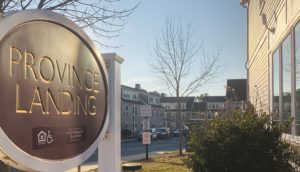PROVINCETOWN — At its first meeting of the new year, Provincetown’s select board will have a pleasant problem on its agenda: more money than it expected.
With $2.2 million in rental tax revenues in from the state for the quarter just ended on Dec. 31, Town Manager Alex Morse told the Independent that Provincetown has now raised its rooms tax revenue estimate for the current fiscal year to $4.7 million — $1.3 million more than had been projected.
Before it was expanded to include short-term rentals, the rooms tax for an entire year brought the town about $2.2 million.
The new estimate will anchor the discussion at the board’s meeting on Monday, Jan. 10, as town leaders take up how much of the new money to direct toward housing and how to rewrite the allocation formula that divides the rooms tax among various town funds.
The extra $2.5 million per year has been a long time coming. Provincetown began asking for a tax on short-term rentals in 2010. The state did not allow such a tax until 2018 when it passed a law that expanded the existing “rooms occupancy tax,” which was already charged on stays in hotels, motels, and campgrounds, to cover bookings in short-term rentals through AirBnb and other such brokers.
That expansion took effect in July 2019, but a lack of good data from the state and a global pandemic that blew a hole in the tourism sector meant it wasn’t initially clear how much new money to expect.
Last fall, town staff forecast the rooms tax would produce $3.4 million this year, but several select board members said that was too conservative. At the time the Independent used state data and information from the market-research website AirDNA.co to predict the total would be $4.7 million.
In December, Town Manager Alex Morse recommended waiting a bit longer before changing the official estimate, to see what the next quarterly payment from the state would bring.
New Money for Housing
The select board has expressed a desire to direct most of the new money toward housing. Because the rooms tax money is parceled out among funds on a percentage basis, that means defining a specific percent of the total to go to housing, and then adjusting the other parts of the formula so the other four funds traditionally supported by rooms tax revenues — the tourism fund, the sewer fund, the capital improvements fund, and the general fund — aren’t shortchanged.
Morse showed how this would work at a Dec. 15 housing workshop. As the total amount of rooms tax increases, the percentage required to level-fund the other four beneficiaries decreases.
With a total of $4.7 million in the pot to be divided, the town could level-fund the four others, give them each a bit extra, and still have $2 million left for housing.
Town leaders have discussed a variety of ways that new housing money could be spent.
“The idea isn’t to go out and buy a single-family home or a condo at market price,” Morse said in October. “This is about a subsidy, to get private developers to invest.” The state likes to see towns contribute to affordable housing projects, Morse added, and even a half-million-dollar investment can help a project secure more state funding.
State and federal tax credits have their own rules, however. Almost all of them are for rental apartments for people making 60 percent of area median income or less. In Barnstable County, that means $40,860 for a single person, or $58,320 for a family of four.
About 40 percent of Provincetown’s households have income in that range, according to the Cape Cod Commission’s datacapecod.org, including both working and retired people. The town’s housing crisis affects many people well beyond this income bracket, though.
The Year-Round Market-Rate Rental Housing Trust was created because even median and above-median earners can’t afford a place to live here. Nathan Butera, chair of the trust, told the Independent that he wants to see if rooms tax money combined with zoning incentives could persuade private developers to include market-rate rentals in their projects.
Select board member Louise Venden told the Independent that she wants to see ownership in the mix as well. “Stable housing, in my opinion, is not just rental housing,” said Venden. “You’ve got to create ownership opportunities for people who work here and make a reasonable but not outrageous amount of money.”
The “buydown” strategy of purchasing deed restrictions on market-rate units has become more expensive, Venden said, but “there’s all kinds of variations. There’s no reason we can’t figure out a way to put this together.”

There is also the matter of land.
Provincetown bought the 2.5 acres on which the Province Landing affordable rental complex was built for only $1 million in 2007. The 1.3-acre former VFW site was purchased in 2013 for $900,000.
But as land becomes more scarce, it’s selling for more. The one-fifth-acre parcel at 30 Shank Painter Road, where Brian O’Malley’s medical practice used to be, was bought by a private developer of market-rate housing in 2020 for $1.2 million. A half-acre parcel adjacent to the VFW project, owned by Paul and Victoria Mendes, was recently listed for sale for $1.7 million.
At the Dec. 15 housing workshop, several people suggested that letting the select board control the new housing allocation, so it could be sent to different funds each year depending on specific projects and needs, made the most sense. Instead of having a fixed percentage go to the Affordable Housing Trust Fund and the Year-Round Market-Rate Rental Housing Trust, the select board could decide each year what priorities mattered most.
That could mean a continual, iterative conversation about housing strategies is in the town’s future. How much money to allocate is the near-term subject; how best to spend it will follow.



